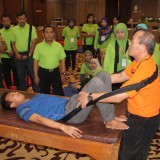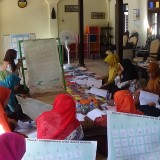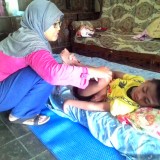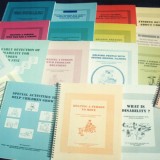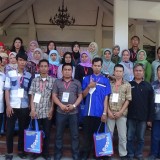The CBR Development and Training Center is a not-for-profit non-governmental organization (NGO) that is a part of YPACNasional. In 1978, after realizing that institutional services were not able to provide assistance to children living in the rural areas of Indonesia (70% of the population) YPAC started to develop their own concept of CBR. The Center now defines CBR as;
A focused community development programs in the field of disability prevention and rehabilitation that enables community members to obtain a better understanding of disability issue, and provide a positive environment for, and improve the quality of life of people with disabilities.
The center also recognizes that CBR is the most cost-effective means of achieving equality and full participation of people with disabilities within their own families, communities, and countries. It is this approach to CBR that the World Health Organization (WHO) was acknowledging when it presented the prestigious Sasakawa Health Award to the CBR Development and Training Center in 1992.
The Center’s approach to CBR is based on the understanding that the problems faced by people with disabilities in their daily lives are not only the result of their individual impairment, but are also the result of attitudes and beliefs of the communities in which the live. The problems that result from negative attitudes (social acceptance, opportunities for income generation, opportunities for education, etc) must be resolved if people with disabilities are to have equal opportunities and if they are to achieve full participation. For these reasons the Center’s programs are directed towards the whole community, as well as the individual members who happen to have a disability.
YPAC was started in Solo by a Prof. Dr. Soerharso in response to the polio epidemic that occurred in Indonesia the early 1950’s. Within a short the time their efforts expended to include providing assistance to other groups of children with physical disabilities such as cerebral palsy. The institutional model that was developed has proven successful and over the years many children have been educated and assisted in other ways. YPAC has grown to where it now includes 16 branches located throughout Indonesia. In 1978 YPAC started to develop their concept of CBR with an early detection programs for disability in young children. By 1983 they were developing manuals and training community volunteers, still in Central Java, to provide assistance to people with disabilities in their own communities. During the next few years the idea provedsuccessful and the numbers of programs were increased. In 1986 a separate section of the YPAC Head Office was created, the CBR Development and Training Center, to handle this expansion. Since then the Center has continued its rapid growth. In 1989 the offices and training facilities described below were officially opened. In 1991 the first international CBR workshop was held in these facilities. In 1992 and outreach CBR Program was started in North Sulawesi in partnership with the local branch of YPAC. Also in 1992 the status of the Center was changed from being a section of the head office group to a special body of YPAC withits own Board of directors from YPAC Nasional.
The Board of Directors who supervise the overall operations and policies of the Center is chaired by one of the senior members of the YPAC Nasional. The group are assisting the Center staff with the development of a management system, program design and implementation, and fund raising.
Funding for the Center’s costs comes from Indonesia and other countries. Some of the Center’s routine operating costs are founded by the board of Directors and other local fund raising activities. Other operating costs are pain by project contributions. Project activities are funded through partnership arguments with NGO’s and international agencies. Because it is an NGO the Center does not receive funds from the Indonesia government.
Programmers and other activities at the CBR Development and Training Center are carried out by a staff of 30. These include field workers, experienced manager, an accountant, educators, rehabilitation professionals, administrators, and support staff. The skills of these Indonesian professionals are supplemented by changing number of international volunteers who work to support various aspects of the Center’s projects, mainly in the areas of development of new training material and staff training. Contract staff are also employed for specialist activities where required.
The programs and other activities of the CBR Developmentand Training Center are directed towards fulfilling the vision and mission statement. Vision: SOLVING DISABILITY ISSUES THROUGH FOCUSED COMMUNITY DEVELOPMENT. Mission: changing community behavior (knowledge, attitude and skills) to enable community members to have a better understanding of disability issues and to provide a positive environment to improve the quality of life of people with disabilities.The three major objectives of these activities :
- Promote the use of CBR as the most effective way of preventing disability and improving quality of life of people with disabilities in every family, community and country.
- Improve existing methods of implementing CBR by developing new ideas to be included to the concept of CBR; and
- Develop the CBR Development and Training Center as a resource for those who are interested in CBR.
In order to achieve these objectives CBR-DTC has been undertaking activities to:
- Conduct training course, seminar, workshop about CBR and related disability issues;
- Conduct research about CBR and related disability issues;
- Provide relevant data and information of CBR and related disability issues, where ever possible, in cooperation with others;
- Promotes increased involvement of people with disabilities in developing, planning, and doing CBR.
- Include in CBR all approaches and 5 components to disability issues (social, educational, livelihood, medical and empowerment component) and all types of disabilities (physical, sensory, developmental, and physiological).
- Develop and produce CBR tools, material resources, manuals, modules, posters, pamphlets, handbooks, etc.
- Implement CBR programs in the field as pilot projects and field laboratory based on new ideas;
- Promote increased involvement of people with disabilities in developing, planning and doing CBR research, training and development;
- Develop close cooperation, communication and coordination with government offices to promote the inclusion of CBR in their programs;
- Develop close cooperation, communication and coordination with NGOs (national, regional and international) and other agencies to share knowledge about CBR development and related disability issues;
- Develop and improve the physical resources necessary for the Center to carry out its proposed activities and to share these resources with others.


